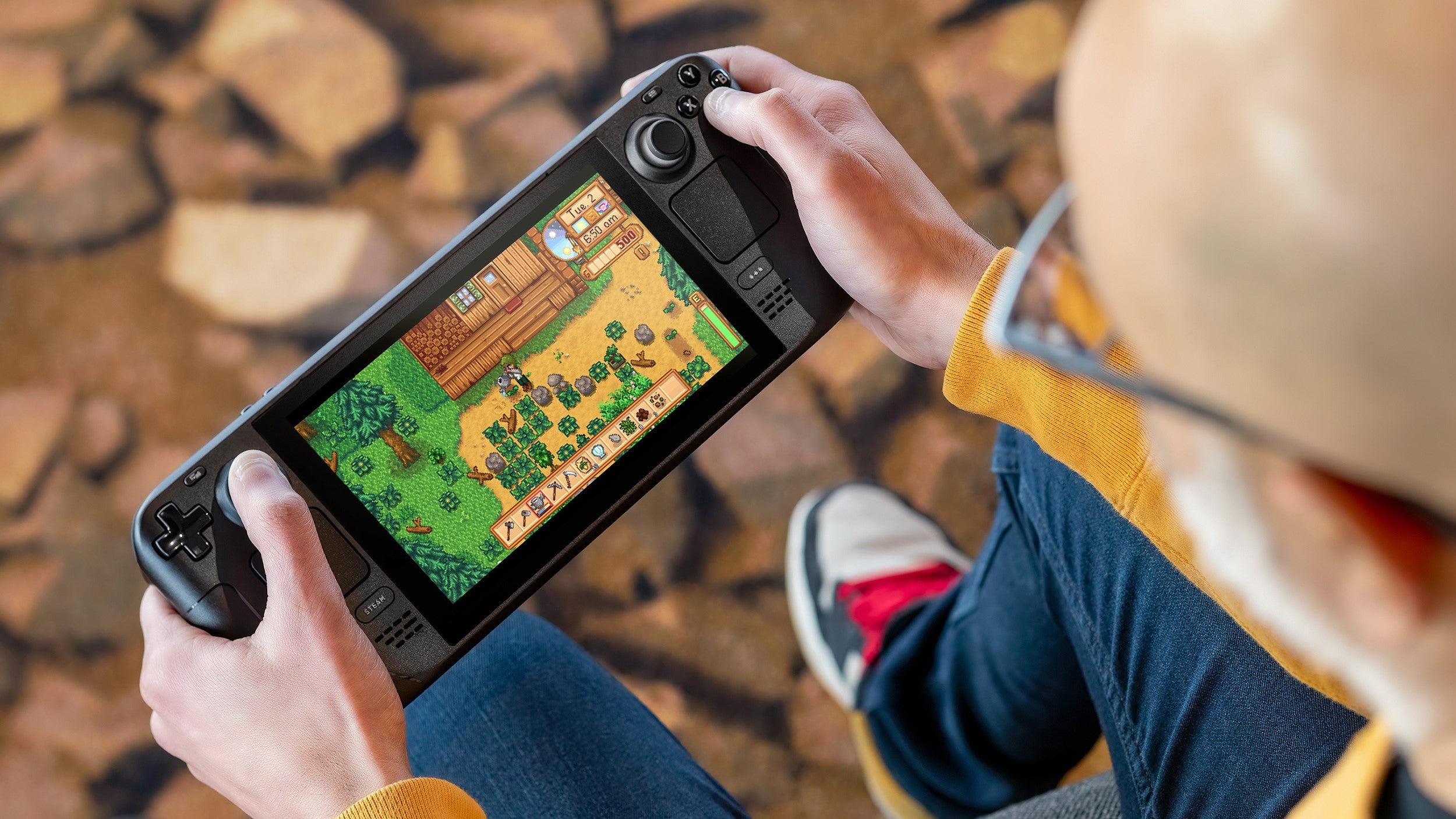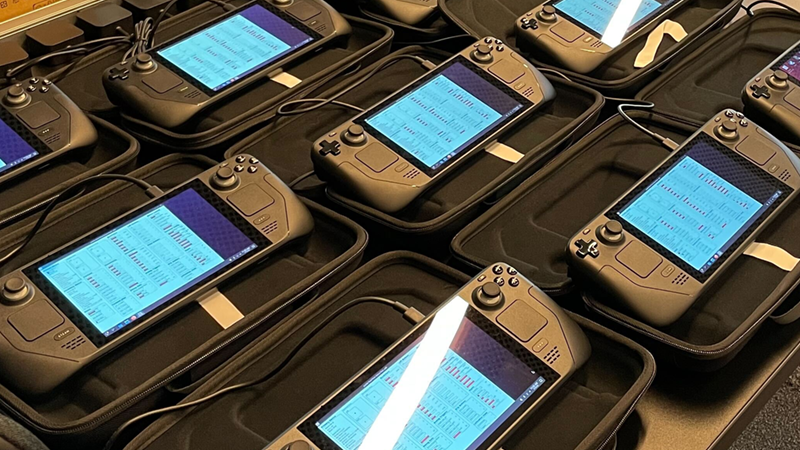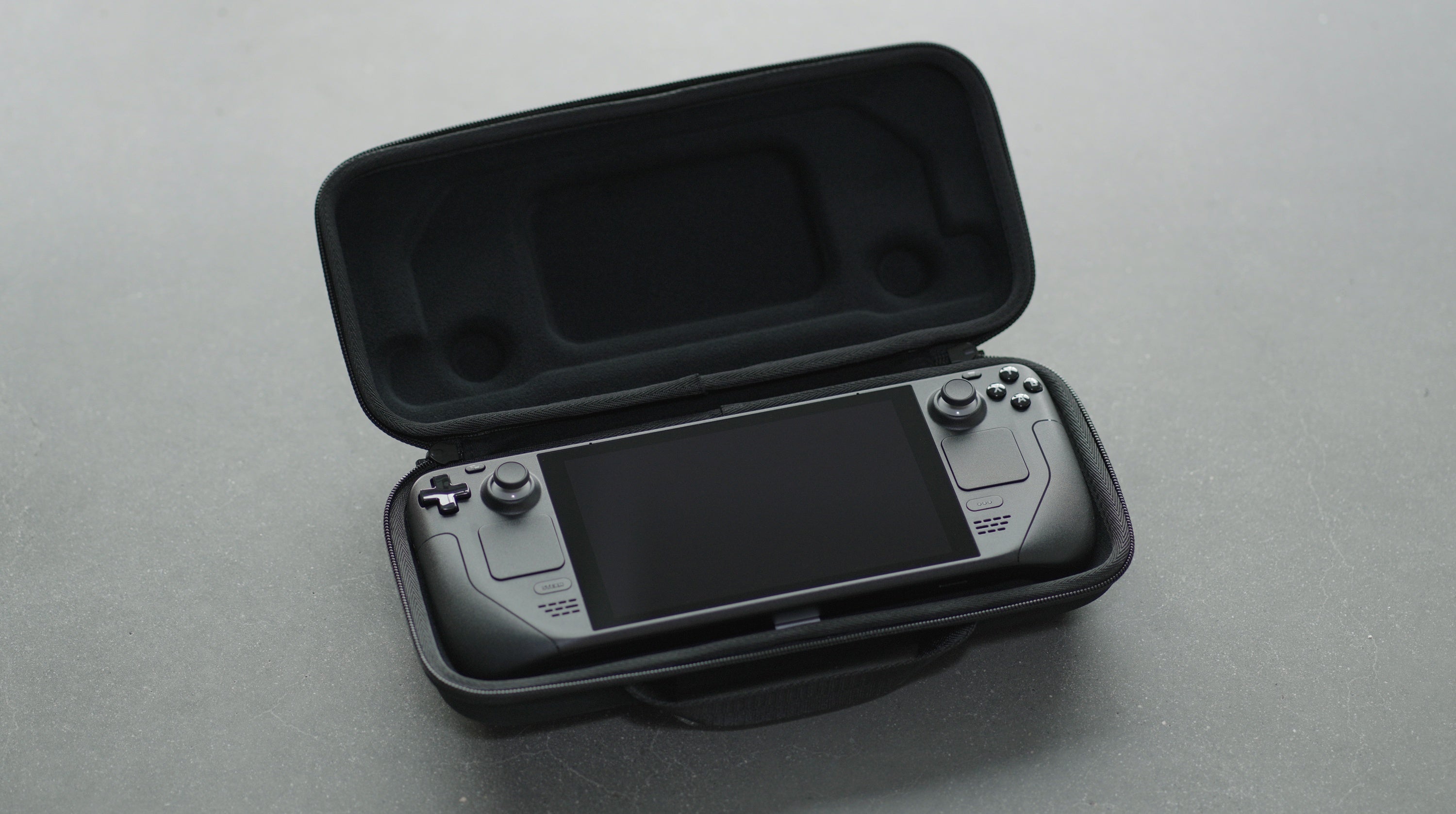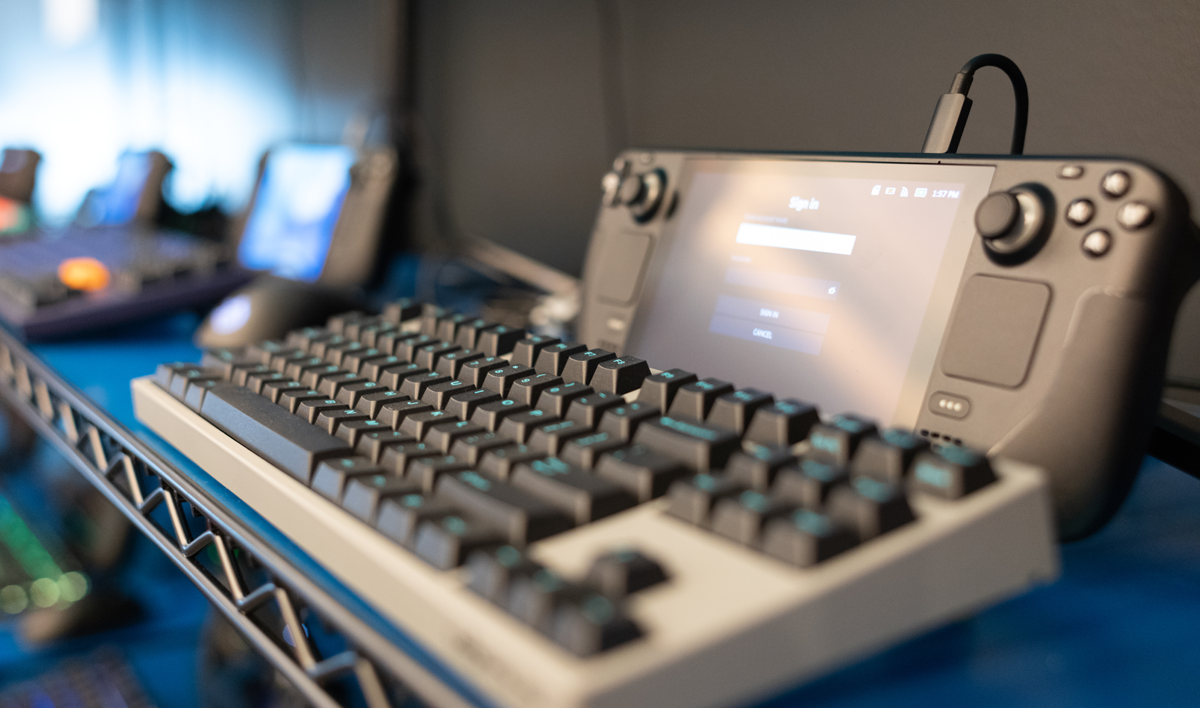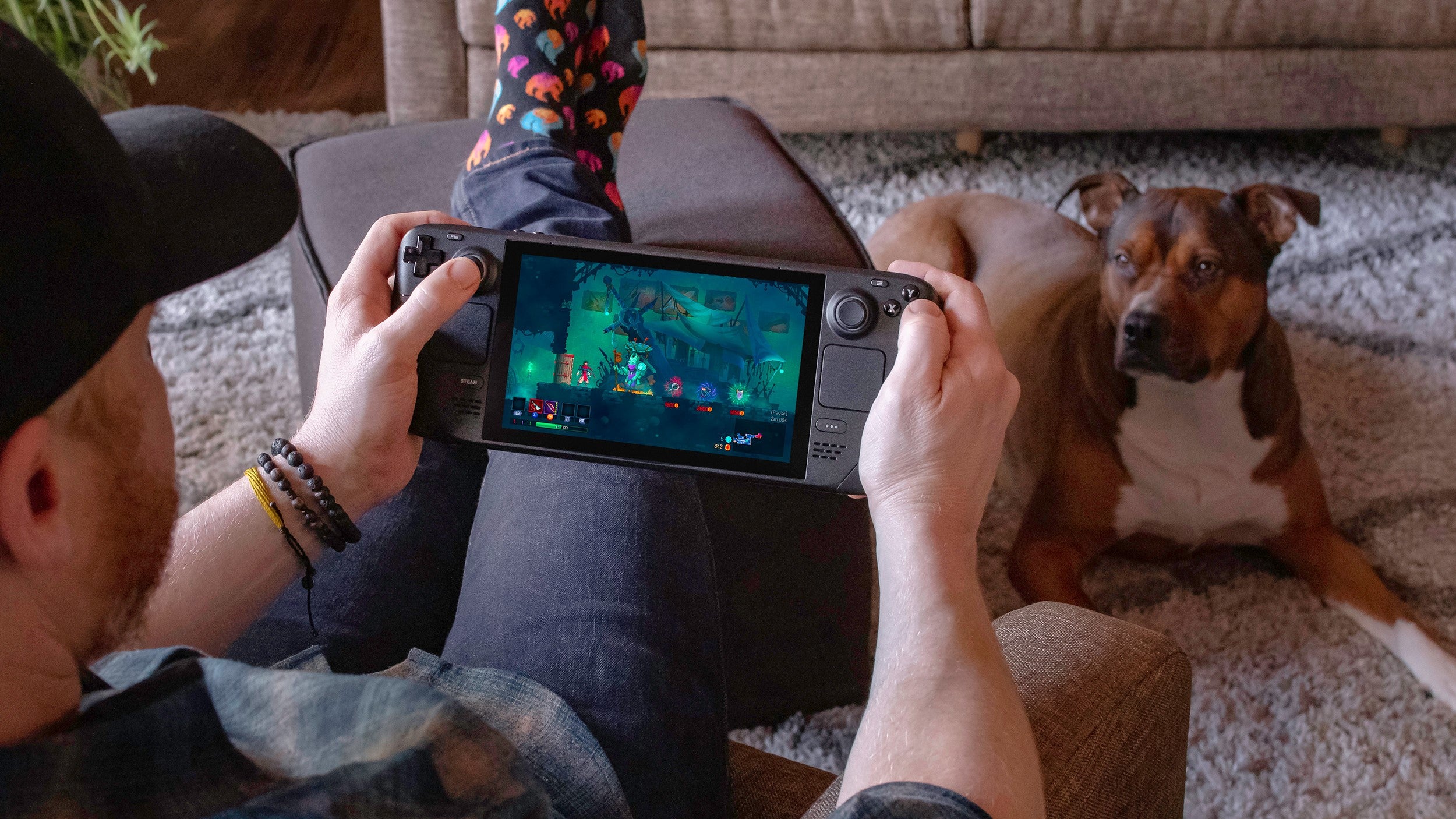For more on the Steam Deck, our full review should be live by the time you’re reading this; I also spoke separately to the two members of the Deck dev team, engineer Pierre-Loup Griffais and designer Jake Rodkin, for a more tech-focused interview that will go up in a few days. In the meantime, here’s our full chat with Gabe Newell. Is the Steam Deck the handheld that Valve always wanted to build? How happy are you with how it turned out? I’m super happy. I mean, if I think back the first time, certainly when I started doing PC games, wanting to have some sort of way of translating that kind of experience into mobile has always been feasible. And we’re finally at the point now where we have, you know, MIPS per watt, where it’s feasible. It’s sort of like the transition between the BlackBerry and iOS: the BlackBerry can basically do one application reasonably well, but then after iOS, you had a much better general purpose mobile computing device. And the sense of pieces where you’d have no-apologies input methods, great screens, sufficient battery life, and GPU/CPU performance to finally come together where we can do it at a $399 price point. So, I think it’s kind of this permanent transition now for PC gaming, where mobile is part of the choices that we can make in terms of the applications we build and the usage scenarios. So yeah, super happy with how it’s turned out, and super happy with where it’s going to go. If subsequently in the future, we just get to ride the price, performance, and power curves that the PC industry is already on, each subsequent generation is going to continue to improve from here. Speaking of the price, it’s almost the opposite of the Valve Index, because that’s a very high-end VR headset; the Steam Deck is more in a category of its own but it’s also a lot cheaper than some of the very cheapest PCs. How did you come to this price point? So when we look at VR, we still continue to believe that the challenge really is building the most sufficiently compelling experience. It was more important with Index to build the best possible experience, and in fact we still think it needs to improve on really basic things in terms of ergonomics, visual fidelity, quality of tracking, and so on. Whereas for the handheld gaming device, traditionally, that’s been a much more price sensitive category. The critical thing wasn’t to expand, radically, the definition of what PC gaming was. The critical thing was, in a price efficient way, to deliver that experience to a mobile audience. So you’re correct in pointing out that they were targeted at different goals. And that’s because of the segments that they’re going to be operating in. It was, I think, in retrospect, probably not as critical to hit the price point. I think we obsessed about it very hard. And then the people who preorder it are all buying the most expensive SKU, way more so than we expected, so the signal that we’re getting from customers is that they would have preferred… I mean, not preferred, we’re definitely selling a lot of the entry level SKU. But if you’d asked me, I would have thought it was 60-70% of that were going to be the low end SKU and it’s sort of reversed. So what our customers are saying is “you’re not giving us enough”, in terms of memory, storage, and performance, or they’d happily pay more. So that’s sort of interesting. That may shift because right now we’re very much at the early adopters, tidal wave of ordering. And so maybe over time, we’ll see a change-up in the SKUs. It’s designed to be able to take the horsepower you have in a PC and deliver it in a super cost-effective way, and we spent a lot of time figuring out how to do that. Are there any lessons, good or bad, from past Valve hardware (like the Index or the Steam Machine) that you kept in mind while making the Steam Deck? The Steam Machine experience made us really think that we needed to deliver a product ourselves rather than working exclusively through third parties. There are a bunch of tradeoffs and a bunch of decisions that you have to make between taking a core concept and delivering it in a box to a customer. And I think it taught us that there’s a lot of value in us going all the way through, solving all the support issues, solving all the packaging issues, solving all the out-of-box experiences, making our decisions about what pricing needs to be, I think that that was one of the lessons we got there. You can’t give people a framework delivering for delivering value to customers and expect them to make a set of choices that are consistent with ones you would have made. It’s just to go ahead and make those choices. And then, once that’s there, then our expectation is having solved all the software and input problems necessary to get a game like Final Fantasy XIV running in a handheld. We’re not going to go and put a bunch of random tweaks on it, because now we have a proven model for what customer success is going to look like. You’ve previously said that the openness of the PC ecosystem is its superpower. Now, there’s been a lot of recent consolidation in the games industry, a lot of platform holders buying up developers, linking certain games to certain consoles or services. Do you think that’s a problem for gaming as a whole? Any sort of acquisition or consolidation has to actually answer the question: how are you creating more value for customers, at the end of the day? How are you making your game developers better developers? If you aren’t doing something like that, then those sorts of acquisitions and consolidations don’t end up positively. And if you do do it, then you know, good, you’re making the gaming market better. So I tend to sort of be more on the sceptical side about what sort of value is being created. I mean, it’s a lot of fun. If you’re a CEO, it’d be like, “Look, I’m making a big deal to make the world better.” When in fact, most of the time, it’s really boring stuff about “how do you make your product better? How do you make your QA processes better?” that are real determiners of success. So I don’t see any evidence that people are turning towards more closed approaches. And also I just don’t think the PC industry will tolerate it. People like the PC and in spite of lots of people preferring other outcomes, PC gaming continues to improve year after year after year, the relative growth versus other closed and proprietary platforms continues to get better. So that’s something that we expect will continue. So there’s not a worry on Valve’s part about consolidation driving games away from the Steam Deck or from the PC? I see no evidence of that today. That isn’t to say it wouldn’t occur, but fundamentally, customers are in the driving seat. And we’re super happy with that, right? Customers don’t like stuff like exclusives or restrictions. It’s pretty expensive to go against that. And the companies that go in the other direction and sort of embrace it, I think are going to be successful for the long run. Steam recently banned games with NFT and cryptocurrency integration, but the wider industry seems to be moving in the opposite direction. Do you think these technologies have any role to play in games at all? You have to separate the underlying technology versus which actors are utilising that technology. It’s like, if you’re a chemist, and you’re looking at nitrocellulose, you’re like “Oh, yeah, we can do some really interesting stuff with that.” And then if everybody’s buying guns and shooting people with them, you’re sort of like, “Hey, this whole chemistry thing is great, but there are some outcomes that can be negative.” Not to equate NFTs with shooting people, but the underlying technology of distributed ledgers, and the notion of digital ownership, and shared universes, are all pretty reasonable. The people in the space, though, tend to be involved in a lot of criminal activity and a lot of sketchy behaviours. So it’s much more about the actors than it is about the underlying technology, or the rationale for what we’re doing. Similarly, at one point Steam was accepting cryptocurrencies for payments. And it turned out that it just made customers super mad. There was the issue of volatility: you don’t want your pricing to vary when anchored to people’s wages. So if you think of “how much I make,” right? It happens to be denominated in things like euros or dollars or whatever. They don’t want to find out that there’s tremendous volatility when they’re actually purchasing things day to day. Like, why did I spend $497 one day to buy a game, and the next day I spent 47 cents, what’s going on here? Volatility is a bad thing in a medium of exchange. That was one problem, that sort of volatility was creating more pain for our customers than the value of having the option of using cryptocurrencies. Another thing was that the vast majority of those transactions, for whatever reason, were fraudulent, where people were repudiating transactions or using illegal sources of funds and things like that. And that’s just out of control, right? You want that number, realistically, in a couple of percent, not half of all transactions turning out to be fraudulent transactions. Similarly, with the actors that are currently in this NFT space, they’re just not people you really are wanting to be doing business with. That doesn’t say anything about the underlying technology, it’s just a reflection of the people right now who are viewing it as an opportunity to rip customers off, or engage in money laundering, or other things like that. So far Valve has been one of the more active companies in Linux gaming, the Steam Deck included. Do you think you’ve been successful in making Linux and open source gaming more viable compared to Windows? Absolutely. There’s a huge amount of effort in order to do the kinds of things we wanted to do. With that, we needed flexibility that was traditionally not available to people. So we’re totally happy if customers want to install Windows onto a Deck, but in order to create a system in which a gamer who’s operating with Linux doesn’t even know that they’re using Linux, that the operating system is transparent in terms of the experience, was one of the critical things that we think we’ve accomplished over the last several years. Speaking of uninstalling and reinstalling operating systems on the Steam deck, was there ever a plan to make it more locked down? Or did it have to be open from the start? I think the openness of the PC is something we love, right? We wouldn’t want to lock anything. I don’t really see the value of locking people into anything. And strategy, you know, there’s a core part of your strategy: start from openness and then build from there. You don’t convince yourself after the fact whether openness is good or bad, you just start from that perspective and roll. And then you’ll be surprised - you don’t know what’s going to end up becoming the really powerful user feature that’s being created by either users or third parties. You just know that sooner or later that that’s going to occur. That’s the same reason we just released the CAD files for the Deck. If there’s some obvious great thing, we would do the obvious great thing; it’s the non-obvious, surprising, cool thing that somebody will come up with, that will make the Deck and Deck-like products much more appealing to users. You don’t know where it’s going to come from, but sooner or later it will come. And that’s part of the power of participating in this kind of open world. It’s probably a pretty optimistic view about collaboration and willingness to be a member of a community, rather than sort of a rigid, controlling, centralising figure. So that sort of goes against my blockchain stuff. Everything is completely distributed. You don’t need centralisation in centralised ledgers at all! (Laughs) You’ve said that working on Half-Life: Alyx fuelled a kind of momentum to do more single player games within Valve. Has the Steam Deck had a similar effect for hardware? I think we’re super excited about the Steam Deck. And we’re also excited about where we can go with it over the next couple of iterations. So I think with this version, we’ve done a great job of delivering a no-excuses mobile gaming experience…y’know, your Steam library just runs. And I think that what’s interesting is to start thinking of features that can be enabled, that give software developers new opportunities to do new kinds of gaming experiences. So right now, it’s like, oh, everything you love about your desktop, PC and mobile platform, but what we also want to start looking at is things that only make sense to mobile gaming. Like, I think Pokémon Go really should have had more more implications for people thinking about the opportunity space for what’s possible with mobile gaming, and it really hasn’t. So I think that that’s one of the things that we’re super excited about is, you know, we built this building block, this pretty critical set of components in order to allow this. And now, we get to do the really fun stuff, where we go into R&D mode. Like a bunch of stuff is just baked, right? If you just look at the roadmaps for CPUs and GPUs for the next couple of years, and when you look at the the volumes that are going to help us drive price-performance curves for what we already have, that’s exciting. But it’s also super exciting to say, let’s go prototype, three or four different new ideas for what he could put into a mobile gaming platform that extend the experience. Go into software developers and have them go, “That’s rubbish,” or “Oh, that’s pretty cool.” Or “Oh my god, you have to do this” and “Let’s start working together on a software prototype to go with your hardware prototype to really test out these features.” That’s pretty exciting, when you can plumb it all the way through to not just… a point where you can do it, but also start opening what you can be doing in those environments. So yeah, we’re pretty fired up. We’ve a lot of appetite for continuing to try to be innovative. By “the next couple of iterations,” are we talking firmware updates and feature updates, or entire new versions of the Steam Deck? I think we’re going to be doing this for a while, right? We think there are a lot of opportunities. I mean, there’s a bunch of obvious stuff. The nice thing about it is software is going to update, and a lot of capabilities in the hardware side are going to continue to improve, those sorts of things. They’re the sort of the ‘behind the curtains’ kinds of updates, where you get a component that’s drawing less power or is a little bit lighter. All that stuff will just happen transparently to customers. But then, looking at doing custom ICs (integrated circuits) in the future, for components that are currently off-the-shelf, that really is going to continue to make them a coarse product that we’ve already defined better. And you kind of get that for free, because we’re operating in the PC space rather than trying to grow everything on our own. And then the new stuff, we just have to go and figure out what it is and how to build it. Are there any specific games you’re enjoying on the Deck or that you’d recommend, as a particularly good example of a Steam Deck game? I’m playing Final Fantasy XIV! I played a tonne of World of Warcraft for a really long time, I sort of played it until my brain broke. I don’t know if you’ve had that experience with video games where you’re just like, no, I can’t do this anymore. Oh yes. One of my sons was playing a bunch of Final Fantasy and he wanted me to play. He wanted to be mad about stuff, like he’d be pentamelding some piece of gear, and it would break 10 times in a row and he’d come in and try to complain me about it. And I’d like “I have no idea what you’re talking about.” And that’s a pretty good game, it has great controller support and so on, so that’s what I’ve been playing. (Transcript edited for clarity.)
